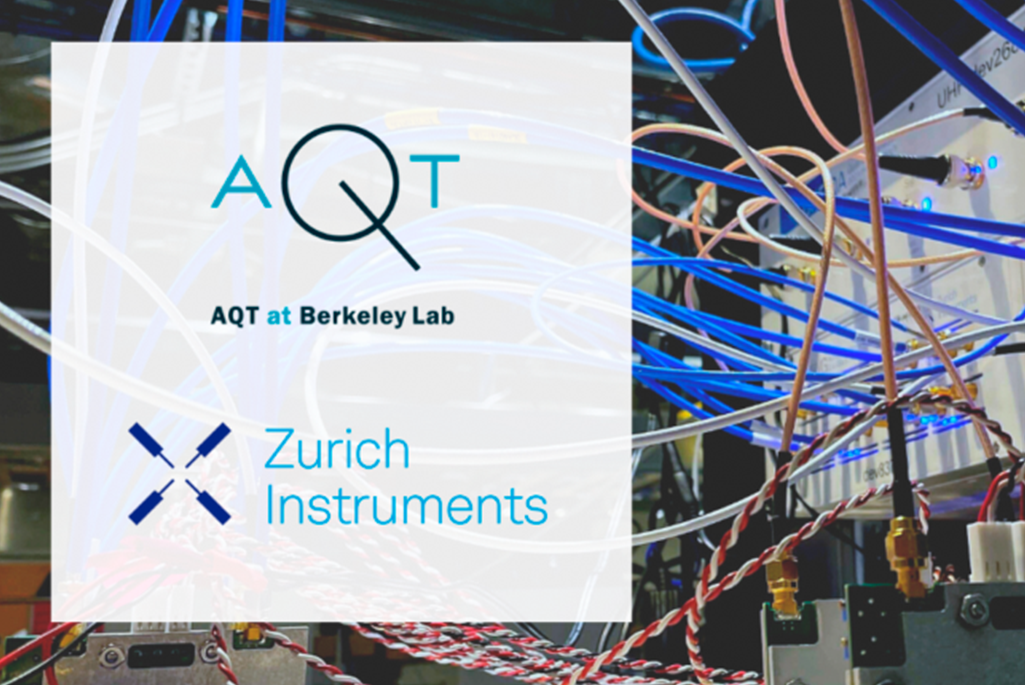The Advanced Quantum Testbed (AQT) at Lawrence Berkeley National Laboratory (Berkeley Lab) is a state-of-the-art collaborative research laboratory funded by the U.S. Department of Energy Office of Science to advance quantum computing based on superconducting circuits. Established in 2018, AQT at Berkeley partnered early on with Zurich Instruments, a leading manufacturer of test and measurement equipment– acquired by Rohde & Schwarz in 2021.
During the first three years, AQT focused partly on deploying and integrating hardware for superconducting quantum computing and developing novel quantum benchmarking techniques. These techniques included quantum characterization, verification, and validation, as well as noise detection, suppression, and mitigation. Zurich Instruments provided cutting-edge instrumentation for AQT’s main cryogenic dilution fridge, “Blizzard.” These instruments include the HDAWG Arbitrary Waveform Generator, the UHFQA Quantum Analyzer, and the PQSC Programmable Quantum System Controller for precision qubit control and readout as well as for fast feedback operations.

Throughout these initial phases, AQT staff has always had regular early access to Zurich Instruments’ control software and firmware candidates for experimentation and beta-testing. In addition, AQT staff and Zurich Instrument engineers worked closely to overcome technical challenges as AQT’S platform explored the performance limits of the control electronics. These collaborative codesign sessions, in turn, resulted in the solutions and real-time improvements that advanced the nascent devices. As a result of these improvements, AQT successfully performed a variety of experimental demonstrations, including quantum simulation, optimization, quantum chemistry, and research in condensed matter, nuclear physics, and high-energy physics.
“Through the close collaboration with researchers from AQT, we learned about new cutting-edge experiment ideas early on,” said Claudius Riek, application scientist at Zurich Instruments. “This helped us improve our control electronics – also it influenced strongly our recently launched next generation of Quantum Computing Control System.”
Zurich Instruments’ software features have been customized and implemented in AQT’s firmware for specific use cases, including the development of new modular quantum control software frameworks to improve upload speeds and performance.
Wim Lavrijsen, computer systems engineer at Berkeley Lab and AQT researcher explained,
“We’ve integrated our internal existing quantum computing software and Zurich Instruments’ to create a flexible software stack that accommodates both custom control needs and lower-level access control for the desired scientific goals.”
The valuable and long-standing relationship between AQT and Zurich Instruments has also been pivotal to building from the ground up the open-access experimental testbed at AQT through a codesign process. Opened to user proposals in 2020, the testbed has supported a variety of projects from academia, national laboratories, and industry executing algorithms for scientific computation, benchmarking the current generation of noisy intermediate-scale quantum hardware, and co-designing next-generation architectures and algorithms.
The field of quantum information science and technology is rapidly evolving, so AQT’s symbiotic partnership with Zurich Instruments has improved hardware functionality and enabled novel modalities for active control.
Zurich Instruments VP Sales and Operations USA, Vikrant Mahajan, said,
“Working with researchers from AQT has been a highly rewarding experience for Zurich Instruments’ quantum team. We are – and especially our US-based team – looking forward to continued collaboration with the AQT team and together pushing boundaries of quantum computing.”
The collaboration further advances AQT’s mission to serve as a cutting-edge quantum information science and technology user hub, while supporting the transfer of pioneering research and development from the lab to the marketplace.
Kasra Nowrouzi, research scientist at Berkeley Lab and AQT’s head of hardware reflected,
“Since its founding, AQT researchers have worked closely with a host of industrial partners to build AQT’s full-stack platform for collaborative experiments at the cutting edge of quantum information science and technology. Our industrial partners have in turn benefited from real-world use and feedback from AQT researchers to further develop their solutions. We look forward to the continuation of such valuable partnerships with Zurich Instruments as we push the boundaries of quantum computing.”
Founded in 1931 on the belief that the biggest scientific challenges are best addressed by teams, Lawrence Berkeley National Laboratory and its scientists have been recognized with 14 Nobel Prizes. Today, Berkeley Lab researchers develop sustainable energy and environmental solutions, create useful new materials, advance the frontiers of computing, and probe the mysteries of life, matter, and the universe. Scientists from around the world rely on the Lab’s facilities for their own discovery science. Berkeley Lab is a multiprogram national laboratory, managed by the University of California for the U.S. Department of Energy’s Office of Science.
DOE’s Office of Science is the single largest supporter of basic research in the physical sciences in the United States, and is working to address some of the most pressing challenges of our time. For more information, please visit energy.gov/science.
